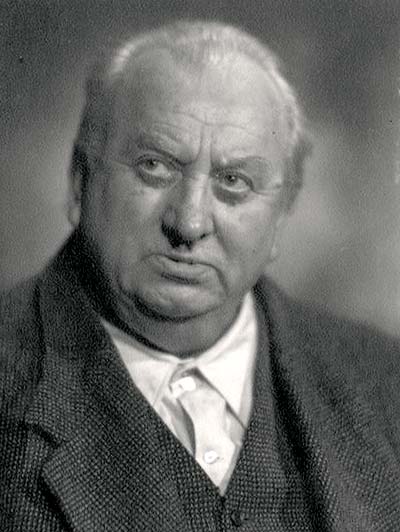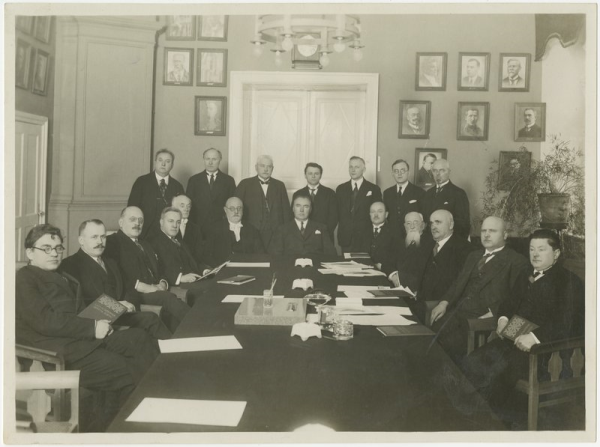Emilis Melngailis
1874–1954
Conductor, composer, folklore collector, music critic
Notable Latvian conductor and composer, made a huge contribution to the collecting and compiling of folk music.
Born on 15 February 1874 at Igate, Vidriži Parish. Attended Igate, Lēdurga, Rauna and Vecpiebalga congregation schools, as well as the Rīga City High School (1887-1891). Studied at the Dresden Conservatory (1896-1897) and at the St Petersburg Conservatory (1898-1901). During his St Petersburg period, worked as a music critic for the St. Petersburger Zeitung newspaper and founded the Melngailis Choir, which he directed in St. Petersburg (1900-1906) and Rīga (from 1920). In 1906, moved to Uzbekistan and worked as an English teacher in Tashkent.
Being opposed to the Vth Song Festival organised by the Rīga Latvian Society, he published a pamphlet Svētnīcu vai balagānu ((Do we want) a Shrine or a Fiasco, 1909) and in Rīga organised his own days of song – the Melngailis Song Festivals (1910-1913 and 1920-1923).
In 1920, returned to Latvia and became active in public life. He participated in the founding of the Latvian Composers’ Group (1923) and the Latvian Song Festival Society (1930), also established the political monthly Austrums (The Orient, 1928).
A chief conductor at the VIth-IXth All-Latvian Song Festivals, Honorary chief conductor at the Xth and XIth All-Latvian Song Festivals, as well as chief conductor of many district and regional days of song and festivals.
Actively devoted himself to collecting, systematising and composing arrangements of folk material – during his lifetime, recorded around 5 000 folk-song melodies and compiled them in Latviešu mūzikas folkloras materiāli (Folkloric Materials in Latvian Music) and Birzīs i norās (In Birch Groves and Glades, 10 volumes, issued 1902-1957). The love and passion with which Melngailis tackled folk-song collecting is shown by an extract from his expedition notes: “From the editorial office, I went to the market where farmers sell butter and cottage cheese. There was no one from Rucava which is some distance from Liepāja. But I found one woman from Nīca. So we drove along the coast to Nīca. I took the reins and guided the filly on to the beach, trotting on the sand. Then she starts singing, admonishing me: ‘Don’t go so fast, don’t run her so hard. These are not your fillies, they’re the Master’s horses, this the Master’s carriage, the Lord’s own whip’. And my heart leapt with joy: so wonderfully alien and sweet – the rhythm of that song. I gave her back the reins, snatched out my book and started writing.” (Kurzemes Vārds. Song collector in birch groves and glades). Liepajniekiem.lv, 19 March 2014)
As a professor at the Conservatory of Latvia, he lectured in the folklore of music (1944-1956). At the same time, he was an active member of the Latvian Composers’ Union and was its first post-war chairman.
Officer, Order of the Three Stars (1926), Latvian SSR People’s Artist (1945), awarded the Order of the Red Banner of Labour (1949).

![8.latviešu dziesmu svētki. 60.g. dziesmu svētki [attēls]. Pirmā rindā no kreisās: Teodors Kalniņš, Jāzeps Vītols, Alfrēds Kalniņš, Emilis Melngailis, Teodors Reiters](https://dziesmusvetki.lndb.lv/wp-content/uploads/objects/41650/resized/2resized_thumbnail.png)













![Emilis Melngailis :[rakstu krājums / N. Grīnfelda ievads]](https://dziesmusvetki.lndb.lv/wp-content/uploads/objects/496861/resized/2resized_thumbnail.png)

![Grupas foto. Viesi pie klātiem galdiem [IX Latviešu dziesmu svētku noslēguma banketā]](https://dziesmusvetki.lndb.lv/wp-content/uploads/objects/518637/resized/2resized_thumbnail.png)